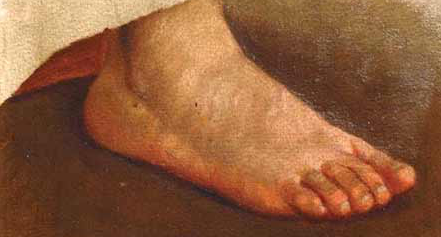| For Dr. Roger Green, in gratitude for his many years of Bible instruction at Gordon College. |
| Rather listen instead? |
| JP members can click the link below for an audio version of this essay.[*]
Paid Content
Premium Members and Friends of JP must be signed in to view this content. If you are not a Premium Member or Friend, please consider registering. Prices start at $5/month if paid annually, with other options for monthly and quarterly and more: Sign Up For Premium  |
Shaking the dust from one’s feet is a powerfully visceral and evocative demonstration of disapproval.[13] As a seminary student I once performed a dust-shaking rite, based on my understanding at that time of Jesus’ command in the Gospels, when concluding a visit to the Flossenbürg extermination camp where Dietrich Bonhoeffer was executed by the Nazis on April 9, 1945. My visit to Flossenbürg was part of a week-long study tour in which we visited sites in Germany, Poland, and the Czech Republic that were of significance in Bonhoeffer’s life.[14] Flossenbürg was the last concentration camp we visited on the tour and shaking the dust from my feet was a way for me to express my rejection not only of horrible atrocities carried out by the Nazi regime, but also my repudiation of the anti-Judaism which has contaminated Christianity for so long and which helped make the atrocities perpetrated by the Nazis possible.
Premium Members and Friends of JP must be signed in to view this content.
If you are not a Premium Member or Friend, please consider registering. Prices start at $5/month if paid annually, with other options for monthly and quarterly and more: Sign Up For Premium
- [1] For a discussion of the rabbinic concept of the ritual impurity of Gentile land, see Shmuel Safrai, “The Land of Israel in Tannaitic Halacha,” in Das Land Israel in biblischer Zeit (ed. Georg Strecker; Göttingen: Vandenhoeck & Ruprecht, 1983), 201-215, esp. 206-207. ↩
- [2] See Safrai, “Land of Israel,” 206; idem, “The Temple,” in The Jewish People in the First Century (2 vols.; CRINT I.2; ed. Shmuel Safrai and Menahem Stern; Philadelphia: Fortress, 1976), 2:903. ↩
- [3] Representatives of what I refer to as the "standard interpretation" include J. Green, 360; Edwards, 262-263. For a fuller bibliography of scholars who adopt various permutations of the "standard interpretation," see David N. Bivin and Joshua N. Tilton, Sending the Twelve: Conduct in Town, Comment to L110. ↩
- [4] In reference to Paul's shaking the dust from his feet (Acts 13:51), Cadbury noted, "It would be strange indeed if Paul should use against the Jews who objected to his Gentile success a gesture that was to be understood principally as the strict Jew's act of purification against Gentile defilement." See Henry J. Cadbury, “Note XXIV: Dust and Garments” (Foakes Jackson-Lake, 5:269-277, esp. 271). ↩
- [5] Commenting on Matt. 10:14 in his Horae Hebraicae et Talmudicae (1658), Lightfoot wrote:
Therefore that Rite of shaking the dust off the feet commanded the disciples, speaks thus much; “Wheresoever a City of Israel shall not receive you; when ye depart, by shaking off the dust from your feet, shew that ye esteem that City, however a City of Israel, for a Heathen, prophane, impure City, and as such abhor it.”
- [6] In as much as it is understood as a means of self-purification, the chimerical rite of dust shaking betrays a fundamental lack of understanding of ritual purity. Simply shaking off the dust of Gentile lands could not have made a person ritually pure. Only ritual immersion and a seven-day period of waiting could remove the impurity of Gentile lands. For an introduction to the biblical concept of ritual purity, see Joshua N. Tilton, "A Goy’s Guide to Ritual Purity." ↩
- [7] Thus, according to Joel Green, "Jesus’ instructions, albeit in a subtle way, circumvent ordinary rules of purity by turning them on their head. Jesus performed no such act of self-purification upon his return from the land of the Gentiles and the domain of the unclean in [Luke] 8:40, for he had found responsive faith even in the midst of impurity and rejection ([Luke] 8:26-39). No longer working narrowly within an ethnic definition of Israel as the people of God, he now declares that those who refuse the salvific visitation of God…are to be regarded as though they were outside the people of God" (J. Green, 360). Joel Green's appeal to the dust-shaking rite is flawed on two scores. First, his contention that Jesus did not perform the dust-shaking rite when crossing from impure Gentile lands into the land of Israel is an argument from silence. Second, Jesus' omission of the dust-shaking rite proves nothing since no such dust-shaking rite ever existed. ↩
- [8] Examples of Jesus’ participation in the system of ritual purity include his baptism in the Jordan river (Matt. 3:13; Mark 1:9; Luke 3:21), his command to the man healed of scale disease to present himself in the Temple (Matt. 8:4; Mark 1:44; Luke 5:14; cf. Luke 17:14), and the command to the blind man to wash in the pool of Siloam (John 9:7), considered in rabbinic sources to be the most potent of all sources of purification (cf. t. Taan. 1:8). ↩
- [9] Foot washing as a basic requirement of hospitable treatment of guests is mentioned in Gen. 18:4; 19:2; 24:32; 43:24; Judg. 19:21; 1 Sam. 25:41; 2 Sam. 11:8. ↩
- [10] On the "others" in Wis. 19:14 as referring to the inhabitants of Sodom, see David Winston, The Wisdom of Solomon: A New Translation with Introduction and Commentary (AB 43; Garden City, N.Y.; Doubleday, 1979), 329. ↩
- [11] This quotation is based on our reconstruction of Jesus' saying in Hebrew and therefore does not exactly conform to either Matt. 10:15 or Luke 10:12. ↩
- [12] Subsequent to the initial release of this article, it was brought to the author's attention that a similar interpretation of the apostles' dust shaking action was proposed by Aaron Eby. See Aaron Eby, "Difficult Sayings of Yeshua," Messiah Magazine 2.5 (2014): 14; idem, "Themes of Destruction: Nineveh, Sodom, and the Flood," Messiah Journal 117 (2014): 36-45. ↩
- [13] For abbreviations and bibliographical references, see “Introduction to ‘The Life of Yeshua: A Suggested Reconstruction.’” ↩
- [14] Dietrich Bonhoeffer was a pastor in Germany who opposed Hitler and who eventually joined the resistance against the Nazi regime. ↩




Comments 4
Thank you! Good work, and yet…
The mention of Sodom is always heavy. Jesus calls it to mind elsewhere as in “the days of Lot” (Luk 17). The name calls to mind a juncture at which redemption is no longer possible. Paul points to Sodom as well in a roundabout way when he discusses those “who did not think it worthwhile to retain the knowledge of God” (Rom 1) and what characterizes them. Are there examples in traditions or writings from the first century in which Sodom was used in such a banal way, i.e. simply with regard to a lack of hospitality?
The widespread assumptions concerning some ritual of “dust-shaking” may very well be off the mark, but the meaning of Jesus’s words are what I’m after. Can we so easily explain away a statement like “Amen! I say to you, it will be more bearable for Sodom on that day than for that town.” ?
Author
Dear CJW,
I am interested in Jesus’ words too, and therefore I would challenge your assumption that denying someone hospitality is somehow banal or trivial. According to ancient sources hospitality is as serious as it gets.
As for the perception that Sodom was guilty of inhospitality, its roots are in the Genesis story, and already in Ezekiel 16:49 we read that the sin of Sodom was negligence toward the poor and needy. Josephus, a first-century C. E. witness, testifies to the tradition that hatred of foreigners and refusal to interact with outsiders characterized the people of Sodom (Ant. 1:194). In one way or another each of these sources on Sodom relates to the issue of hospitality.
For a fuller discussion about what Jesus’ comparison of a town that denied hospitality to his apostles to Sodom may have been getting at, check out Sending the Twelve: Conduct in Town, Comment to L119-120.
An informative and uplifting article — yet another beautiful example of the in-depth research you, David, and others do at Jerusalem Perspective, all of which enriches our reading of Scripture. Thank you, Joshua!
I think the author is on the right track here. If there was dust on the apostles’ feet, then we can assume it was still there because it had not been washed off. Also, shaking the said dust from their feet was all they were to do. “Lord, do you want us to call fire down from heaven to destroy them?” (Lk 9). Jesus’ answer was no.